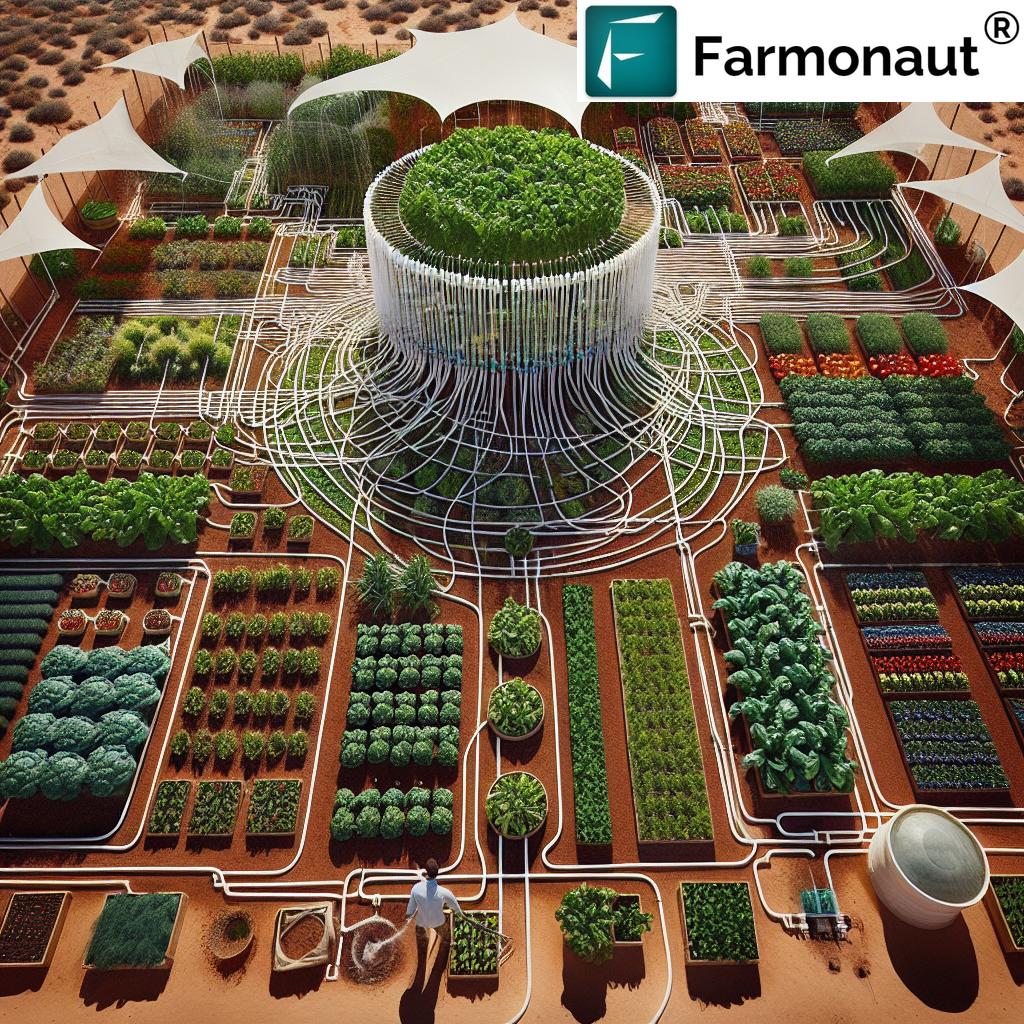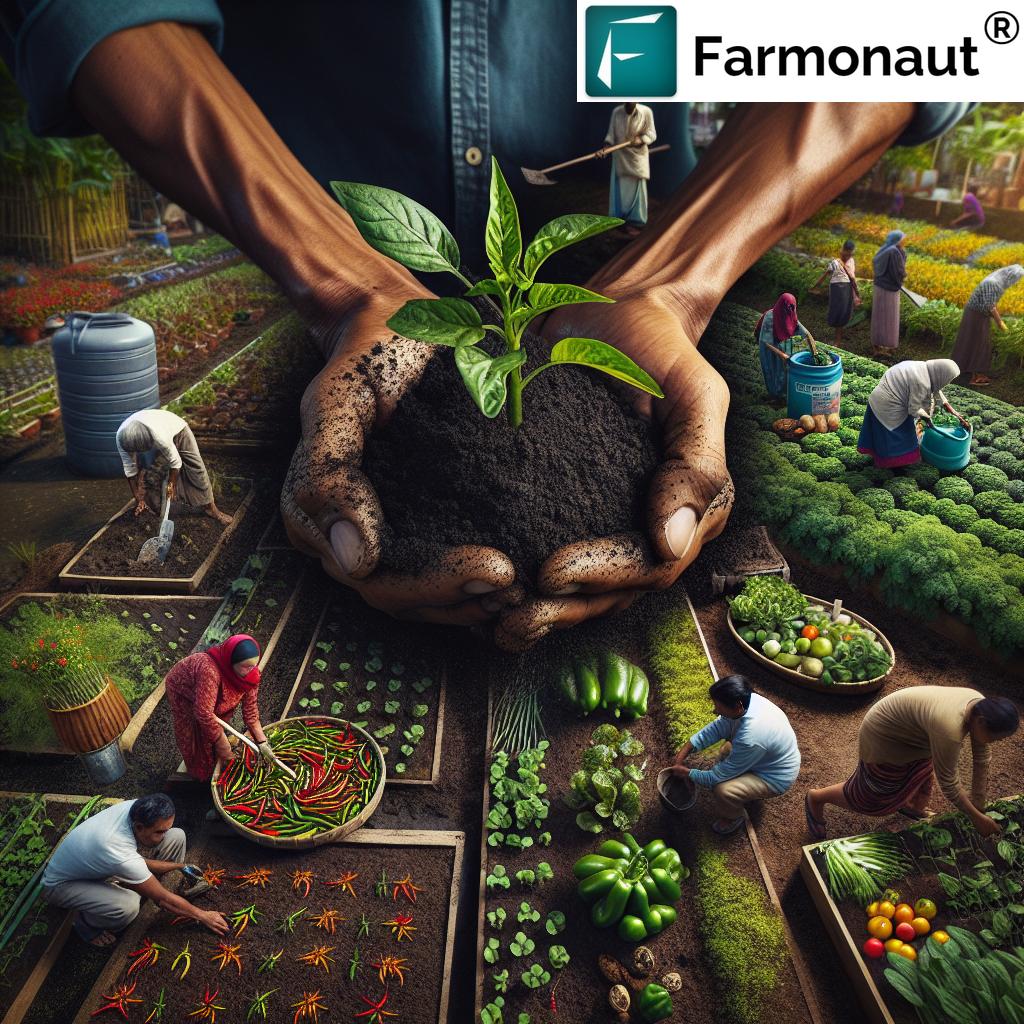Innovative Backyard Gardening in Mariental: Thriving Through Drought with Sustainable Agriculture Techniques
“In Mariental, Hardap region, a resilient gardener cultivates over 5 different vegetable varieties using innovative water-saving techniques in arid conditions.”
Welcome to our inspiring journey through the arid landscapes of Mariental, where innovative backyard gardening is transforming lives and landscapes. In the heart of Namibia’s Hardap region, we’ll explore how resilient gardeners are overcoming drought challenges to create thriving vegetable gardens. This blog post delves into the world of sustainable agriculture techniques that are revolutionizing small-scale farming in water-scarce environments.

The Resilient Spirit of Mariental’s Backyard Gardeners
In Mariental, a town known for its challenging climate, we find extraordinary examples of human ingenuity and perseverance. Among these inspiring individuals is Pinias Namwandi, a 30-year-old gardener whose story embodies the spirit of resilience that defines this community. Since 2021, Namwandi has nurtured a flourishing vegetable garden behind his home in the Oshiwana Penduka informal area, demonstrating that with determination and innovative techniques, gardening in arid climates is not only possible but can be remarkably successful.
From Childhood Lessons to Sustainable Farming
Namwandi’s journey into gardening began in his childhood, under the guidance of his grandmother in Oshakati. It was here that he learned the fundamental principles of farming, including the importance of nurturing crops with love and care. These early lessons laid the foundation for his current success in backyard gardening.
After completing his education, Namwandi returned to Mariental with a dream of becoming a farmer. Despite the harsh environmental conditions of intense heat, strong winds, and water scarcity, he established a vegetable garden where he now grows a variety of crops, including:
- Tomatoes
- Beetroot
- Chillies
- Various types of spinach
Innovative Water-Saving Irrigation Methods
One of the most impressive aspects of Namwandi’s garden is his use of innovative water-saving irrigation methods. In a region where water is a precious resource, he has devised creative solutions to maximize efficiency:
- Plastic Bottle Irrigation: Namwandi repurposes plastic bottles as a drip irrigation system, allowing for controlled and targeted watering of his plants.
- Moisture Preservation Techniques: He covers his plants with sheets to preserve moisture, significantly reducing water evaporation and usage.
These techniques not only conserve water but also demonstrate the potential of innovative small-scale agriculture in addressing food security challenges in drought-prone areas.
A Day in the Life of a Dedicated Gardener
Namwandi’s daily routine is a testament to his dedication. His day starts early, tending to his plants before heading to his job as a security guard. In the evening, he returns to care for his garden, ensuring that each plant receives the attention it needs to thrive in the harsh Mariental climate.
Overcoming Challenges in Arid Gardening
Despite his success, Namwandi faces significant challenges, primarily related to water access. Often, he must make long trips with a wheelbarrow to fetch water for his garden. However, his determination remains unshaken. He plans to relocate his garden closer to a water source and dreams of expanding his operation to a larger area.
Community Impact and Affordable Produce
Namwandi’s garden isn’t just a personal project; it’s a vital contribution to his community. By selling affordable vegetables, he’s enhancing food security in Mariental. A bag of spinach from his garden costs just N$10, making fresh, nutritious produce accessible to his neighbors. On average, he earns N$50 per week from these sales, demonstrating the economic potential of backyard gardening in arid regions.
“Sustainable backyard gardening in drought-prone areas can reduce water usage by up to 70% through creative irrigation methods.”
Support from Agricultural Ministries
Recognizing the value of Namwandi’s efforts, the local ministry of agriculture has provided support in the form of seeds, poles, and shade nets. This collaboration between innovative gardeners and government bodies is crucial for developing sustainable agriculture techniques that can be scaled and replicated across the region.

The Power of Knowledge Sharing in Agriculture
Namwandi strongly advocates for collaboration among those in the agricultural sector. He believes that sharing knowledge and resources is key to addressing food security challenges in the region. This philosophy of community-supported agriculture is vital for the growth and sustainability of farming in challenging environments.
Inspiring Youth Engagement in Agriculture
With aspirations to transform his passion for gardening into a sustainable career, Namwandi also encourages youth to invest in the agricultural sector. He recognizes the crucial role of agriculture in the country’s economy and urges young people to use their creativity and labor, whether in crafting or farming, to forge unique avenues for economic growth.
Innovative Techniques for Drought-Resistant Vegetable Farming
Let’s explore some of the key sustainable agriculture techniques that are making a difference in Mariental and similar arid regions:
| Technique | Benefits | Implementation Tips |
|---|---|---|
| Plastic Bottle Drip Irrigation | Reduces water usage by up to 70%, precise water delivery to plant roots | Perforate bottle caps, bury bottles neck-down near plants, refill as needed |
| Mulching with Organic Materials | Retains soil moisture, suppresses weeds, improves soil fertility | Apply a 2-3 inch layer of straw, leaves, or grass clippings around plants |
| Drought-Resistant Vegetable Selection | Increases crop survival rate, reduces water demand | Choose varieties like okra, sweet potatoes, and cherry tomatoes |
| Companion Planting | Maximizes space, improves pest control, enhances soil nutrients | Plant marigolds with tomatoes, beans with corn |
| Shade Netting | Reduces evaporation, protects plants from intense sunlight | Install 30-50% shade cloth above sensitive crops |
Climate-Adaptive Farming Practices for Arid Regions
Adapting to the harsh climate of Mariental requires a combination of traditional wisdom and modern innovation. Here are some climate-adaptive farming practices that are proving effective:
- Keyhole Gardens: These circular raised beds with a composting basket in the center are excellent for water conservation and soil fertility.
- Vertical Gardening: Utilizing vertical space helps maximize yield in small areas and can reduce water evaporation.
- Rainwater Harvesting: Even in arid climates, collecting and storing rainwater during rare precipitation events can be crucial for garden survival.
- Soil Improvement: Adding organic matter and using compost can significantly improve soil’s water retention capacity.
These practices not only help in cultivating fertile soil but also contribute to the overall sustainability of backyard gardens in water-scarce regions.
The Role of Technology in Small-Scale Farming
While traditional methods form the backbone of Mariental’s backyard gardening success, modern technology is increasingly playing a role in enhancing agricultural practices. Agritech solutions for small-scale farmers are making a significant impact:
- Soil Moisture Sensors: These devices help gardeners monitor soil moisture levels accurately, optimizing watering schedules.
- Weather Forecasting Apps: Access to accurate local weather predictions allows gardeners to plan their activities more effectively.
- Crop Disease Identification Apps: These tools help in early detection and management of plant diseases, crucial in resource-constrained environments.
For those interested in leveraging technology for their gardening projects, platforms like Farmonaut offer innovative solutions. You can explore their services through their  or check out their mobile apps:
or check out their mobile apps:
Urban Gardening for Beginners: Lessons from Mariental
The success stories from Mariental offer valuable insights for urban gardening beginners worldwide. Here are some key takeaways:
- Start Small: Begin with a few hardy plants and expand as you gain experience.
- Focus on Water Efficiency: Implement water-saving techniques from the start.
- Choose Appropriate Plants: Select vegetables that are well-suited to your local climate.
- Learn Continuously: Stay open to learning new techniques and adapting your methods.
- Connect with Community: Share experiences and resources with fellow gardeners.
The Economic Importance of Small-Scale Farming
The impact of backyard gardening extends beyond personal sustenance. In Mariental and similar regions, these small-scale agricultural efforts contribute significantly to local economies. They provide:
- Supplementary income for families
- Affordable, fresh produce for communities
- Opportunities for entrepreneurship and innovation
- Reduced reliance on imported foods
By supporting and expanding these initiatives, regions like Hardap can enhance their food security and economic resilience.
Future Prospects: Scaling Up Sustainable Agriculture
As we look to the future, the potential for scaling up these sustainable agriculture techniques is immense. With continued support from agricultural ministries, integration of appropriate technologies, and the passion of gardeners like Namwandi, we can envision:
- Expanded community gardens
- Integration of drought-resistant vegetable farming into school curricula
- Development of local seed banks for arid-adapted plant varieties
- Creation of farmer-to-farmer training programs
These initiatives could significantly boost food production in arid regions while maintaining ecological balance.
Conclusion: A Green Revolution in the Desert
The story of backyard gardening in Mariental is more than just an agricultural success; it’s a testament to human resilience and innovation. In the face of harsh climatic conditions, gardeners like Pinias Namwandi are not just growing vegetables; they’re cultivating hope, sustainability, and a blueprint for food security in challenging environments.
As we’ve seen, the combination of traditional knowledge, innovative techniques, and modern technology can transform even the most arid landscapes into productive gardens. The lessons learned here in Mariental have the potential to inspire and guide similar initiatives around the world, particularly in regions grappling with drought and water scarcity.
We encourage our readers to take inspiration from these stories and consider how they might implement some of these sustainable practices in their own gardens, regardless of their location. Whether you’re managing a small balcony garden in a bustling city or a larger plot in a suburban area, the principles of water conservation, soil health, and community engagement are universally applicable.
Remember, every small step towards sustainable gardening contributes to a larger movement of environmental stewardship and food security. Let’s embrace these innovative techniques and work together towards a greener, more sustainable future for all.
FAQ Section
Q: What are the main challenges of gardening in Mariental’s arid climate?
A: The primary challenges include intense heat, strong winds, water scarcity, and poor soil quality. Gardeners must innovate to conserve water and protect plants from harsh environmental conditions.
Q: How can I start a drought-resistant garden in my backyard?
A: Begin by selecting drought-tolerant plants, implementing water-saving irrigation methods like drip systems, using mulch to retain soil moisture, and creating shade structures to protect plants from intense sun.
Q: What are some easy-to-grow vegetables for beginners in arid climates?
A: Good options include tomatoes, peppers, eggplants, okra, and leafy greens like spinach and kale. These vegetables are relatively hardy and can thrive with proper care in arid conditions.
Q: How can technology assist in small-scale farming?
A: Technology can help through soil moisture sensors, weather forecasting apps, crop disease identification tools, and platforms like Farmonaut that offer satellite-based crop monitoring and management solutions.
Q: What are the economic benefits of backyard gardening in areas like Mariental?
A: Backyard gardening can provide supplementary income, reduce household food expenses, offer affordable fresh produce to the community, and create opportunities for small-scale entrepreneurship.






